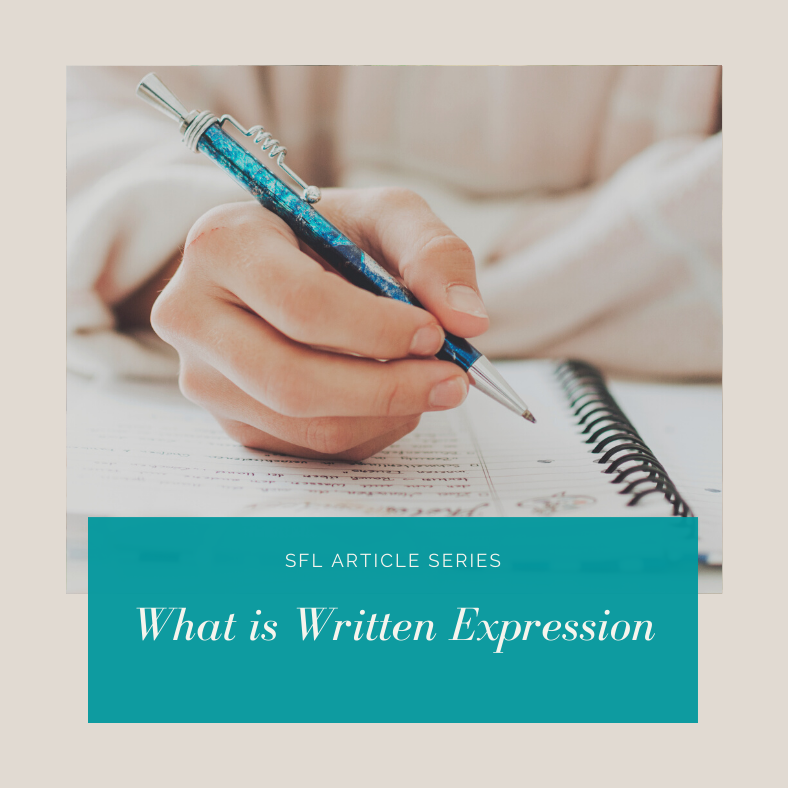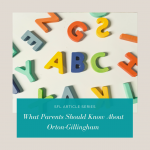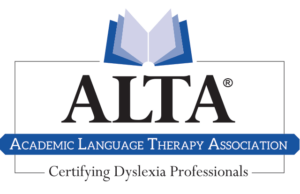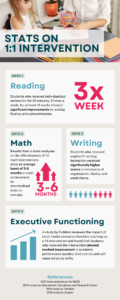No products in the cart.

What is Written Expression?
Written expression is a complex process of using various cognitive operations to translate ideas and thoughts into a written language. These operations include many components including but not limited to the ability to communicate coherent ideas, grammar and writing mechanics, the ability to create words and sentences fluently, and the ability to utilize the writing process.
What is Specific Learning Disability Impairment in Written Expression?
This refers to a type of learning disability specific to children and teens with writing impairments. A student with SLD in Written Expression can exhibit difficulties in spelling accuracy, grammar and punctuation accuracy, and/or the clarity and organization of their written expression. Common characteristics involve challenges with handwriting, fine motor skills, motor patterns for letters, spelling analysis, comprehension of spelling rules, and written composition, leading to complex errors in syntax, morphology, semantics, and a lack of logical cohesion in their writing.
What is the Best Intervention for Specific Learning Disability Impairment in Written Expression?
The best intervention is one that is tailored to your child or teen’s specific needs. It will take into account their areas of weakness and strengths and will likely be a combination of teaching strategies, accommodations in the classroom, and therapeutic interventions. An experienced Educational Therapist can provide individualized evidence-based writing interventions and make recommendations for accommodations and other services like occupational therapy. Learn more about Educational Therapy and how it can help struggling writers.
How does Executive Functioning Affect Writing?
Executive function deficits are often related to difficulties with writing. Executive function skills are critical to the student’s ability to organize, plan, prioritize, and utilize working memory and cognitive flexibility, all skills essential for the writing process.
How Does AHD Affect Writing?
Similarly, written expression can be challenging for students with ADHD. Children and teens with ADHD may have difficulty organizing their thoughts and breaking down the writing process. They may easily get overwhelmed with bigger writing assignments and even though they may have great ideas and know the content very well, they will likely have difficulty translating that into writing.
Written Expression Tips for Children and Teens with ADHD
Here are a few strategies to try out if your child or teen is struggling with writing.
1. Break down tasks into small steps: Dividing the writing process into smaller, manageable steps can make it less overwhelming.
2. Use graphic organizers: When used correctly, graphic organizers can help organize ideas visually. They can be effective in improving reading comprehension, help with critical thinking, and are useful for communicating ideas.
3. Use Assistive Technology: Take advantage of tools like spelling and grammar-checkers and voice-to-text tools. Learn more about Different Types of Assistive Technology and Its Uses.
4. Create Structure: Have a dedicated time and workspace for writing. It should ideally be during a time when the student is not burnt out and in a space with minimal distractions. Learn more about creating a tailored workspace for students with learning disabilities.
5. Work with an Educational Therapist or ADHD Coach: An experienced educational therapist or ADHD coach can provide targeted strategies to help students struggling with written expression. Learn more about Educational Therapy and ADHD Coaching.
With appropriate support and strategies, children and teens with ADHD can improve their writing skills.
Useful Online Tools for Written Expression
Graphic Organizer Templates: Creately offers the “ultimate list of graphic organizers” for teachers and students. They offer templates for almost every type of writing like a story chart, sequence chart, and many others!
Graphic Organizer Maker: You can create custom graphic organizers using this free online tool!
Related Articles
Looking for Academic Support and other Educational Services?
You can schedule a free initial consultation to learn more about our services. We will listen to your concerns, answer any questions, learn about the student’s needs, and help guide you through our new student intake process.






